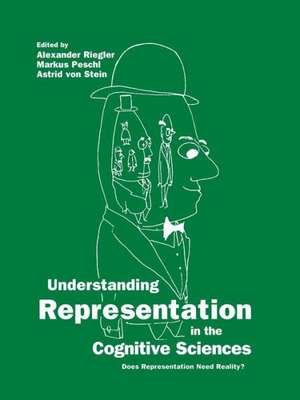Understanding Representation in the Cognitive Sciences: Does Representation Need Reality?
Editat de Alexander Riegler, Markus Peschl, Astrid von Steinen Limba Engleză Paperback – 26 apr 2013
| Toate formatele și edițiile | Preț | Express |
|---|---|---|
| Paperback (1) | 1105.77 lei 6-8 săpt. | |
| Springer Us – 26 apr 2013 | 1105.77 lei 6-8 săpt. | |
| Hardback (1) | 1108.72 lei 6-8 săpt. | |
| Springer Us – 31 ian 2000 | 1108.72 lei 6-8 săpt. |
Preț: 1105.77 lei
Preț vechi: 1163.97 lei
-5% Nou
Puncte Express: 1659
Preț estimativ în valută:
211.61€ • 219.67$ • 176.45£
211.61€ • 219.67$ • 176.45£
Carte tipărită la comandă
Livrare economică 25 martie-08 aprilie
Preluare comenzi: 021 569.72.76
Specificații
ISBN-13: 9781475772456
ISBN-10: 1475772459
Pagini: 320
Ilustrații: VIII, 304 p.
Dimensiuni: 210 x 279 x 17 mm
Greutate: 0.7 kg
Ediția:1999
Editura: Springer Us
Colecția Springer
Locul publicării:New York, NY, United States
ISBN-10: 1475772459
Pagini: 320
Ilustrații: VIII, 304 p.
Dimensiuni: 210 x 279 x 17 mm
Greutate: 0.7 kg
Ediția:1999
Editura: Springer Us
Colecția Springer
Locul publicării:New York, NY, United States
Public țintă
ResearchCuprins
Position Paper.- Does Representation Need Reality?.- Overview of Contributions.- Different Facets of Representation.- The Connectionist Route to Embodiment and Dynamicism.- The Ontological Status of Representations.- Empirical and Metaphysical Anti-Representationalism.- Representation in Cognitive Neuroscience.- Cognition without Representation?.- Computational Approaches.- On Computing Systems and Their Environment.- Representation and Cognitive Explanation.- When Coffee Cups Are Like Old Elephants, or Why Representation Modules Don’t Make Sense.- The Recommendation Architecture: Relating Cognition to Physiology.- Cognition as a Dynamical System.- Neurodynamics and the Revival of Associationism in Cognitive Science.- The Dynamic Manifestation of Cognitive Structures in the Cerebral Cortex.- Response Selectivity, Neuron Doctrine, and Mach’s Principle in Perception.- Mental Representations: A Computational-Neuroscience Scheme.- Relevance of Action for Representation.- Sketchpads In and Beyond the Brain.- Inductive Learning with External Representations.- Does the Brain Represent the World? Evidence Against the Mapping Assumption.- Perception Through Anticipation. A Behaviour-Based Approach to Visual Perception.- Symbol Grounding nad Language.- Rethinking Grounding.- Reality: A Prerequisite to Meaningful Representation.- Explorations in Synthetic Pragmatics.- Communication and Social Coupling.- Does Semantics Need Reality?.- Empiricism and Social Reality: Can Cognitive Science Be Socialized?.- Habitus and Animats.- Processing Concepts and Scenarios: Electrophysiological Findings on Language Representation.- Constructivist Consequences: Translation and Reality.- Qualitative Aspects of Representation and Consciousness.- The Observer in the Brain.- Reality andRepresentation Qualia, Computers, and the “Explanatory Gap”.- Constructivism.- Can a Constructivist Distinguish between Experience and Representation?.- How Animals Handle Reality- The Adaptive Aspect of Representation.- Piaget’s Legacy: Cognition as Adaptive Activity.

















